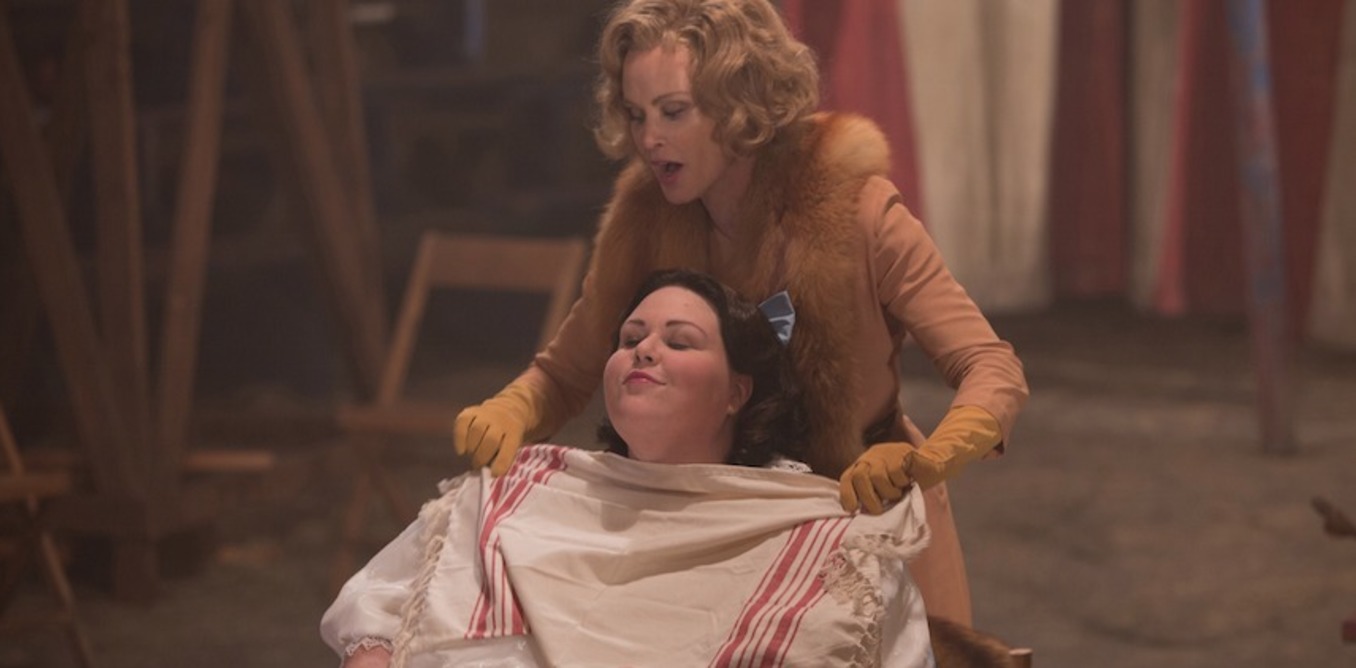Following months of media hype, American Horror Story (AHS) returns this September with an election theme that seems set to maintain the TV show’s tradition of inspiring controversy and debate. This time around, showrunners have signalled that the notoriously graphic and scary franchise will address a very contemporary source of angst: American politics.
Over six seasons since its first screening in 2011, AHS has drawn on spooky settings such as haunted houses and asylums, and extraordinary communities such as a witches’ coven and a troupe of freaks, to provoke emotions from repulsion to fascination.
But, sensationalism aside, this popular programme also repeatedly grapples with serious issues – tackling topics of race, gender and sexuality, as well as exploring themes of the individual, family and community. Past examples include the treatment of the freaks in Freak Show and the history of race in the US in Coven. The six seasons have had a clear focus on female characters – and big names such as Angela Bassett, Kathy Bates and Jessica Lange have been recognised with awards and nominations for their portrayal of strong older women.

Spooky: Lady Gaga in American Horror Story. FX
The “anthology” format, whereby each season consists of a finite run of episodes and familiar actors return to take on different roles, has great creative potential. Each new season means a fresh start – and the impending season, subtitled Cult, takes the US election night as its starting point, tapping into the fraught aftermath of the 2016 race for the White House.
Concept art released in recent months to whet appetites for the new series includes imagery known from previous seasons, such as Twisty the Clown, in addition to a nightmarish caricature of an elephant reminiscent of the Republican party symbol. Teasers, TV spots and a recently released poster dwell heavily on clowns and bees.
The visual emphasis on groups and swarms, along with a fake promo seemingly for the cult itself, suggests anxiety about mass delusion – even a mob mentality. In a year marked by large-scale protests and social unrest, conspiracy theories and fake news, Cult will resonate with an increasingly politicised audience.
Pushing boundaries
The show’s co-creators Ryan Murphy and Brad Falchuk – collaborators on a number of high-profile, glossy dramas – are known for pushing boundaries of taste. Nip/Tuck (2003–2010) combined graphic scenes of surgery with turbulent storylines about body image and identity, while true crime anthology series American Crime Story (2016–) places similar stress on mature content. Glee (2009–2016), though a musical comedy-drama set in a high school, routinely focused on social issues such as gender identity, coming out and teen pregnancy.
Murphy and Falchuk are no strangers to challenging topics and, through continually reinventing AHS, they have a perfect forum for exploring the taxing times of recent months. Indeed, in dropping hints about the upcoming season, Murphy has used social media to make the point that the events of election night were a source of real-life horror for many Americans. Cult‘s provocative promotional campaign feeds off this lingering atmosphere of unease and pessimism about public life in America.
.@MrRPMurphy teases how he plans to tackle the 2016 election in the upcoming season of 'American Horror Story' @AHSFX pic.twitter.com/i6wEby9RFj
— Hollywood Reporter (@THR) June 12, 2017
A quality that unites these Murphy and Falchuk collaborations is their excess, in terms of both their subject matter and imagery. The horror genre has often been stigmatised as focusing on excessively repellent, frightening and lurid scenarios, and some people find such material objectionable – but in general a taste for horror has endured.
With horror’s focus on extremes it may seem that the promise of escaping the everyday is central to the genre’s appeal. Yet this is a genre that frequently offers social commentary. From the earliest Gothic novels through to 21st-century youth fiction, horror has given authors and audiences a space to critique the pressing issues of their times.
Using supernatural threats such as ghosts and vampires and human monsters such as serial killers, AHS has provided precisely such a vehicle. This season’s focus on politics – in what Murphy has called a “modern-day story” – makes Cult its most socially-minded offering yet.

Twisty the Clown at the Comikaze Expo 2015. RyC - Behind The Lens
Television horror has gone from strength to strength in recent years, as shows from Penny Dreadful (2014–2016) to The Walking Dead (2010–) offer up the intricate narratives and complex protagonists expected by contemporary TV audiences. AHS has made a distinctive name for itself in this new environment, not least because of Murphy and Falchuk’s creative input and its flexible format.
Cult’s intriguing marketing enhances their own horror canon and the genre’s reputation for challenging stories. Trump’s slogan “Make America Great Again” has been a rallying cry for those unhappy with the direction of the US in recent years. Yet many who saw themselves in the TV narratives of AHS, with its emphasis on minority groups and themes of social exclusion, are now struggling to see themselves in this new national narrative.
When the US premiere takes place September 5, eager viewers will no doubt find that AHS has once again succeeded in tackling real world concerns, this time by highlighting the social and political divisions that characterise Trump’s America.
 Rebecca Janicker does not work for, consult, own shares in or receive funding from any company or organisation that would benefit from this article, and has disclosed no relevant affiliations beyond the academic appointment above.
Rebecca Janicker does not work for, consult, own shares in or receive funding from any company or organisation that would benefit from this article, and has disclosed no relevant affiliations beyond the academic appointment above.



 Netflix Shuts Down Boss Fight Entertainment, Developer of “Squid Game: Unleashed” Amid Gaming Strategy Shift
Netflix Shuts Down Boss Fight Entertainment, Developer of “Squid Game: Unleashed” Amid Gaming Strategy Shift  FCC Chair Brendan Carr to Face Senate Oversight After Controversy Over Jimmy Kimmel Show
FCC Chair Brendan Carr to Face Senate Oversight After Controversy Over Jimmy Kimmel Show  Trump Proposes Two-Year Shutdown of Kennedy Center Amid Ongoing Turmoil
Trump Proposes Two-Year Shutdown of Kennedy Center Amid Ongoing Turmoil  Trump Faces Mixed Reception at Kennedy Center Amid Conservative Overhaul
Trump Faces Mixed Reception at Kennedy Center Amid Conservative Overhaul  BTC Flat at $89,300 Despite $1.02B ETF Exodus — Buy the Dip Toward $107K?
BTC Flat at $89,300 Despite $1.02B ETF Exodus — Buy the Dip Toward $107K?  Trump to Pardon Reality Stars Todd and Julie Chrisley After Tax Fraud Conviction
Trump to Pardon Reality Stars Todd and Julie Chrisley After Tax Fraud Conviction  George Clooney Criticizes Trump’s Tariff Threat, Calls for Film Tax Incentives
George Clooney Criticizes Trump’s Tariff Threat, Calls for Film Tax Incentives  Pulp are back and more wistfully Britpop than before
Pulp are back and more wistfully Britpop than before  FxWirePro- Major Crypto levels and bias summary
FxWirePro- Major Crypto levels and bias summary 
































